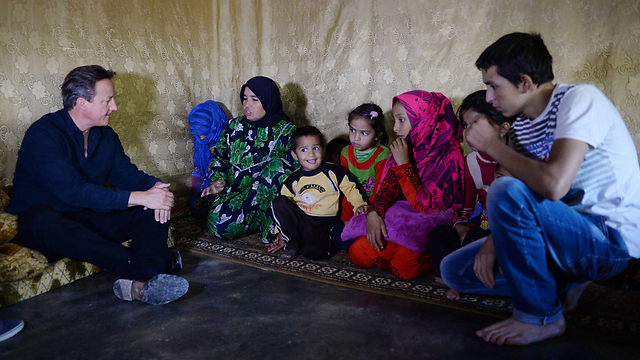
Sealing the borders of compassion in Europe
Op-ed: While the EU needs millions of new workers in order to stabilize its pension system, immigrants' contribution to its labor market is disputable, and instead of integration there is more radicalization.
Only two weeks ago, Germany and Austria – two countries with a dark past – announced an open border policy, taking in refugees without limitations. A model of boundless humanism, unlike Hungary, which limited its compassion. Two weeks have passed, and Germany and Austria have also decided, in an unusual move, to supervise their borders.
There is no need to shout, "They mustn't do to the refugees today what they once did to the Jews." Nor should we cry out, "They will Islamize Europe."
The picture is a bit more complicated. Those who are fleeing for their lives deserve refuge and boundless compassion. But many of the asylum seekers are searching for a better life. They are miserable. Any sane person would do what they are doing. But there are no furnaces waiting for them.
They are escaping the Sharia rule and don’t want to impose the Sharia. So Europe is deliberating. It's a difficult dilemma precisely because the EU should not be deciding about the refugees' fate – between life and death. It should be deciding between a miserable life and opening gates, which will turn the hundreds of thousands of the past few weeks into millions in the coming months.

Europe is aging. It needs millions of new workers in order to be able to pay pensions. But in practice, it's not at all clear whether the new migrants are the solution. Studies published in the past decade reveal grim findings. In Sweden, for example, the unemployment rate among Muslims is four to 10 times higher (depending on the country of origin) than the general population.
In England they checked the lack of participation in the labor force according to countries of origin. Among the Somalis it was 81 percent; among the Turks - 59 percent; among the Bangladeshis - 56 percent; among the Pakistanis - 55 percent. In general, 53 percent of Muslim men and 76 percent of Muslim women in the age of labor are unemployed, compared to 16.7 percent and 24.6 percent, respectively, among the general population. We are talking about veteran immigrants, including members of the second generation.
The situation is similar in Germany. Forty percent of children under the age of 10 in Berlin are the sons and daughters of immigrants, and the unemployment rate among the Turks in the same city is 40 percent.
The labor market is not welcoming them with flowers. Even if they have similar skills, people with names like Ahmed and Mustafa encounter severe discrimination while looking for a job. The blatant discrimination is against Muslims, more than against black people or other foreigners. The situation is similar in all European countries.
So while the official policy is to welcome the refugees, something different is happening in the labor market. And in any event, the dependency of many immigrants - including members of the second generation - on the welfare system, along with the high unemployment rates, cast doubts on the myth of immigrants' contribution to preventing the pension system's collapse.
Germany, with a population of 80 million people, is capable of dealing with one million immigrants a year, and the EU, with 500 million people, is capable of taking in a higher number. But after two weeks of protests in favor of the asylum seeker, the pendulum is starting to swing in the opposite direction. Suddenly, it's not entirely clear that they are all refugees, their contribution to the labor market is disputable, instead of integration - as surveys about members of the second generation of immigrants prove - there is more radicalization, and the accumulated experience in the past few decades raises questions.
Israel is part of the picture too. In Michel Houellebecq's book "Submission," about Islam's takeover of France, he tells the story of the main character's Jewish girlfriend who is forced to emigrate to Israel. It's not that in Israel everything is wonderful, but he complains that he "has no Israel" to escape to.
There is a loud minority living among us which wants to turn Israel into a state of all its citizens. A state of immigrants. A democratic state, but no longer a Jewish state. That won't happen, mainly so that in the updated edition of "Submission," Houellebecq won't tell us that his main character's Jewish lover has nowhere to escape to.










